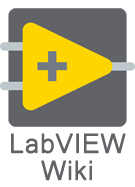Bundle function: Difference between revisions
Started page |
mNo edit summary |
||
| Line 1: | Line 1: | ||
{{stub}} | {{stub}} | ||
{{TOCright}} | {{TOCright}} | ||
{{LabVIEW Palette Object Information|palette=Functions Palette/Programming/Cluster, Class, and Variant{{!}}Cluster, Class, and Variant palette|type=function}} | {{LabVIEW Palette Object Information|palette=Functions Palette/Programming/Cluster, Class, and Variant{{!}}Cluster, Class, and Variant palette|type=function|icon=Cluster, Class, & Variant Palette - Bundle.png}} | ||
The '''Bundle''' function assembles a cluster from individual elements. | The '''Bundle''' function assembles a cluster from individual elements. | ||
Latest revision as of 20:07, 29 June 2020
| |
This article is a stub. You can help LabVIEW Wiki by expanding it. Please improve this article if you can. |
| Object information | |
|---|---|
| Owning palette(s) | Cluster, Class, and Variant palette |
| Type | Function |
| Requires | Basic Development Environment |
| Icon | |
The Bundle function assembles a cluster from individual elements.
You also can use this function to change the values of individual elements in an existing cluster without having to specify new values for all elements. To do so, wire the cluster you want to change to the middle cluster terminal of this function. When you wire a cluster to this function, the function resizes automatically to display inputs for each element in the cluster. The connector pane displays the default data types for this polymorphic function.
Resize this function to indicate the number of elements in a new cluster. You cannot resize this function when an existing cluster is wired to the cluster input.
When you create a new cluster, you must wire all the inputs. The elements in the output cluster must appear in the same order as the input elements. When you wire an existing cluster to the middle terminal of this function, the inputs are optional. LabVIEW replaces only those cluster elements that you wire.
Uses
| |
Specific use cases for this function. |
History
| |
History information is needed. What changes have occurred over previous versions? |
| Version | Change(s) |
|---|---|

|
More info to come. |
See Also
| |
Add links to internal wiki pages that would also help. |
External Links
| |
Add links to external resources that would also help. |
